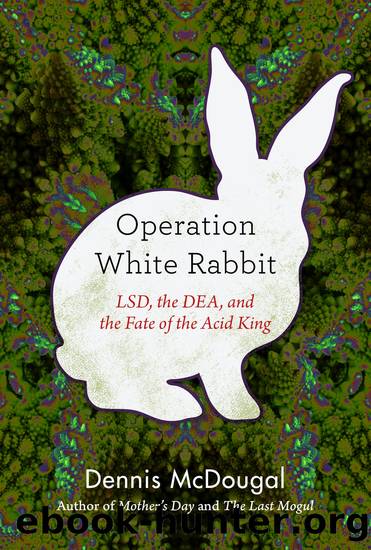Operation White Rabbit by Dennis McDougal

Author:Dennis McDougal
Language: eng
Format: epub
ISBN: 9781510745384
Publisher: Skyhorse
Published: 2020-10-14T16:00:00+00:00
Pickard paid over $15,000 to American Express, Citibank, and MBNA in 1996, but sent nothing to the IRS. He filed no Form 1040 that year or the next, nor for the remainder of the decade. He later explained that he either tapped into the tax-free trust left him by his parents or earned below the annual $10,000 filing minimum. He was a poverty case far too busy trotting the globe, making new friends, and warning the world about fentanyl to concern himself with money matters.
A huge benefit of studying at the Harvard Kennedy School was his exposure to second-, third-, and fourth-tier government officials: career apparatchiks characterized as essential members of the Deep State, but rarely recognized beyond Washington, DC.
CIA operations officer John Kenneth Knaus was just the sort of superspy Leonard would never have met outside Harvard. Best remembered as the agent who helped extract the Dalai Lama from Tibet in 1959, Knaus was a research associate at Harvardâs Fairbank Center for Chinese Studies when Leonard approached following one of Knausâs lectures. Breaking the ice, Leonard mentioned that heâd once met the CIAâs Robert Rewald3 in Terminal Island.
âOh, you mean that thing in Hawaii?â Knaus had asked.
âYes, that thing in Hawaii.â
Pickard quickly explained how he made Rewaldâs acquaintance while in prison. Leonard told Knaus that a government misunderstanding over âerrant lab equipmentâ landed him briefly behind bars. Heâd been mistakenly found guilty of drug manufacture and did a little federal time. He met several remarkable characters while inside including Akbar Bai and Rewald, but once Leonard walked free, heâd flipped over a new leaf. Voila! He was now a Harvard fellow.
âKnaus nodded somberly,â recalled Pickard, âbut with a detectable air of guardedness, for this CIA operations officer had forgotten more secrets than most remember.â
Pickard could tell by the hesitancy in Knausâs voice and the subtle shift of eyeballs behind his bifocals that heâd switched from chatty to cautious.
âHe concluded that his new visitor, presumed at first to be an innocent HKS matriculant, had perhaps a roguish background that, as in Heisenbergâs uncertainty principle, might shift perspective the closer it was observed. . . .â
Knaus twitched his mustache. âIâll check with Langley,â he told Leonard.
Knaus wasnât the first, nor would he be the last, Kennedy School adjunct to hold Leonard at armâs length. If heâd checked with Langley as he said, Leonard heard nothing further about it. He and Knaus never spoke again. From thence forward, Leonard convinced himself to be more circumspect. He might be under government surveillance.
Nonetheless, Leonard used his other newly-developed CIA and State Department contacts to gain further foreign introductions. The Russian head of the MVD4 (Ministry of Internal Affairs) was the first to grant him an audience in Moscow.
âAn inroad,â he said. âI kept recordings of those interviews.â
The MVD contact led to others: Major General Alexander Sergeev, chief of MVDâs drug division; Minister of Drugs Eduard Babayan; Vladimir Sorokin, chief chemist for the Russian National Forensics Laboratory. . . .
Pickard became a regular Russophile. The rise of fentanyl was now a cornerstone of his Kennedy School studies.
Download
This site does not store any files on its server. We only index and link to content provided by other sites. Please contact the content providers to delete copyright contents if any and email us, we'll remove relevant links or contents immediately.
Spare by Prince Harry The Duke of Sussex(5165)
Machine Learning at Scale with H2O by Gregory Keys | David Whiting(4281)
Never by Ken Follett(3918)
Harry Potter and the Goblet Of Fire by J.K. Rowling(3834)
I Have Something to Say by John Bowe(3489)
Unfinished: A Memoir by Priyanka Chopra Jonas(3361)
Fairy Tale by Stephen King(3353)
Greenlights by Matthew McConaughey(3141)
The Man Who Died Twice by Richard Osman(3055)
Will by Will Smith(2891)
Think Again by Adam Grant(2448)
Rationality by Steven Pinker(2340)
It Starts With Us (It Ends with Us #2) by Colleen Hoover(2317)
Can't Hurt Me: Master Your Mind and Defy the Odds - Clean Edition by David Goggins(2309)
The Dark Hours by Michael Connelly(2289)
The Storyteller by Dave Grohl(2211)
Friends, Lovers, and the Big Terrible Thing by Matthew Perry(2208)
The Dawn of Everything: A New History of Humanity by David Graeber & David Wengrow(2177)
The Becoming by Nora Roberts(2177)
